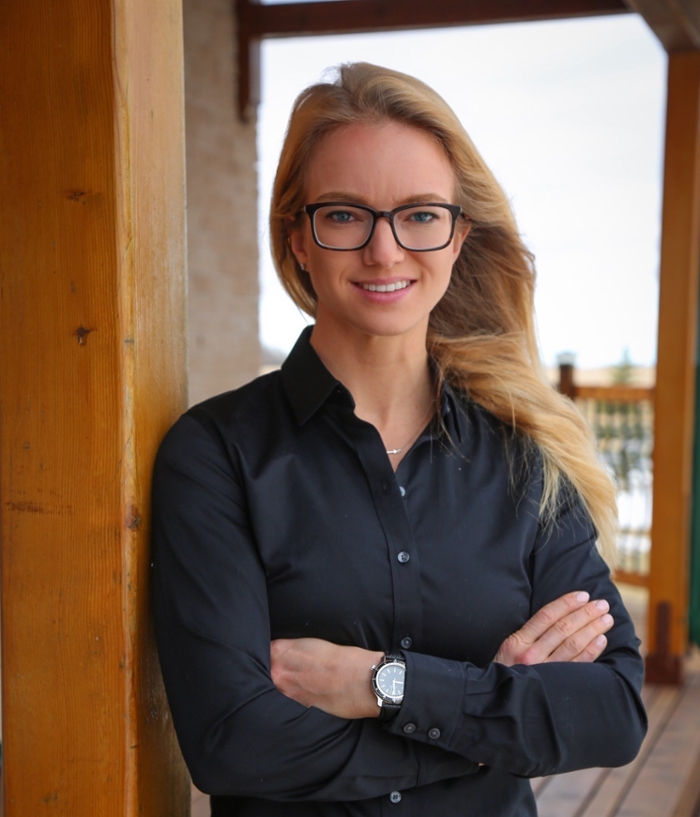
Engineering grad student wins USask's 3 Minute Thesis Competition
Master's student Shaunti Bergen is researching the use of fire-resistant hydraulic fluid in underground potash mines.
By Donella HoffmanIn a 3 Minute Thesis competition, grad students get 180 seconds to describe their research – and can rely only on their presentation skills and one PowerPoint slide to make their work interesting and understandable.
Shaunti Bergen, a mechanical engineering master's student in the University of Saskatchewan (USask) College of Engineering, took on the challenge and won this year's USask 3 Minute Thesis event. It was held via Skype at the end of March, organized by USask's Graduate Students' Association.
The win was worth $1,000 and earned Bergen a trip to the Western Regional Finals (which are indefinitely postponed due to COVID-19).
Bergen, who expects to complete her degree this spring if all goes well, is researching the use of fire-resistant hydraulic fluid in underground potash mines. The objective is to help prevent fires and make the mines safer for workers. Her work was funded by NSERC (National Sciences and Engineering Research Council of Canada) and Nutrien, which has five underground potash operations in Saskatchewan.
For the competition, Bergen outlined the logistics of replicating the hydraulic systems from the mines in the lab and reviewed the current findings of fire-resistant hydraulic fluid, which prove its abilities.
We asked Bergen about her research and the 3 Minute Thesis competition.
Why did you choose to explore this area of research?
Growing up, my dad ran an agricultural manufacturing company (Bergen Industries) where I started working when I was eight years old. It was here that I learned to weld and assemble many types of agricultural equipment and trailers.
A large portion of the assembly process was adding the hydraulic systems to the equipment and this intrigued me. I appreciated the simple way hydraulics could create so much power and I always wanted to know more.
When I started engineering, my goal was to finish school and find an area of work where I could be helping people. I was unsure what that looked like but it was very important to me to feel as though I was making people's lives better by the work I did. When the opportunity came to not only do my master's focusing on hydraulic systems but to also increase the safety for workers in underground potash mines, I could not say no.
Why did you decide to enter the 3 Minute Thesis competition?
I saw the ad for the competition in the stairwells of the college but was unsure about entering. I do really enjoy public speaking and have done well at it, being the emcee for the C.J. Mackenzie Gala and also winning top presenter of my graduate seminar. So I finally convinced myself to give it a try, only to my dismay I found out that I had missed the deadline. I thought all hope was lost until I received another email saying they had extended the deadline, so this time I applied right away.
Was it difficult to distill your research into a three-minute presentation?
This was way more difficult than I thought it would be. I spent approximately five hours redoing my presentation outline. Being in engineering I am so used to making the data and results the climax of my presentation, but with a diverse audience and only three minutes, I could not go that route. This turned into a fun challenge for me and once I was done, I had a real sense of accomplishment as now I had a concise, thorough way of explaining what I had been up to.
What do you think made your presentation stand out?
That is a very good question and one I'd like to know the answer to! If the competition had gone as it usually does I would have had the opportunity to sit in and watch other presenters. But due to COVID, each contestant's presentation was recorded via Skype then sent to the judges, so it is hard for me to tell what allowed my presentation to stand out. If I were to guess I'd say it was due to the confidence I have in my project thanks to all the support I have received from my supervisor, Travis Wiens, and many other professors and staff at the college. A large credit also goes to the Rhetorical Communication (RCM) class engineering students are required to take. The course has benefitted me so many times and needs to get as much recognition as it can.
(Note: The RCM class is offered by the Graham School of Professional Development, which is part of the College of Engineering and offers classes in entrepreneurship and communication.)

